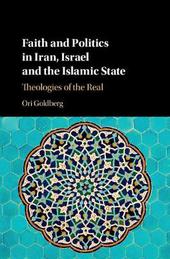
|
Faith and Politics in Iran, Israel, and the Islamic State: Theologies of the Real
Hardback
Main Details
| Title |
Faith and Politics in Iran, Israel, and the Islamic State: Theologies of the Real
|
| Authors and Contributors |
By (author) Ori Goldberg
|
| Physical Properties |
| Format:Hardback | | Pages:206 | | Dimensions(mm): Height 235,Width 156 |
|
| ISBN/Barcode |
9781107115675
|
| Classifications | Dewey:320.955 |
|---|
| Audience | | Postgraduate, Research & Scholarly | |
|---|
|
Publishing Details |
| Publisher |
Cambridge University Press
|
| Imprint |
Cambridge University Press
|
| Publication Date |
21 December 2017 |
| Publication Country |
United Kingdom
|
Description
Religious faith has been gaining in reach and influence throughout global politics over the last three decades, most prominently in the Middle East, and theologies of this nature are based on the understanding that faith in God is to be based, primarily and predominantly, on the realness of God's presence. The West, accustomed to its own discussion on religion and politics emphasising democracy and individual freedoms, has been at a loss to explain and engage these rising religious polities. Through an innovative approach to the role of faith in politics, Faith and Politics in Iran, Israel, and the Islamic State considers political theologies of the real formulated during the twentieth century and proposes that, while religion in the West has been committed to absolutist vision, these theologies have drawn their strength from a commitment to their concrete, divinely infused reality.
Author Biography
Ori Goldberg teaches at the Lauder School of Government, Diplomacy and Strategy at the Interdisciplinary Center Herzliya. He was a Fox International Fellow at Yale University, Connecticut, and a research fellow at the Shalom Hartman Institute in Jerusalem. He is the co-author of Understanding Shiite Leadership: The Art of the Middle Ground in Iran and Lebanon (Cambridge, 2014).
Reviews'Through an innovative approach to the role of faith in politics, this volume considers political theologies of the real formulated during the twentieth century and proposes that, while religion in the West has been committed to absolutist vision, these theologies have drawn their strength from a commitment to their concrete, divinely infused reality.' Interpretation: A Journal of Bible and Theology
|